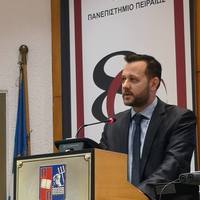Teaching Documents by Grigorios Papathomas
2 Εισοδικό «Ἀρχὴ παιδεύσεως ἡ τῶν ὀνομάτων ἐπίσκεψις». (Ἀντισθένης ὁ Κυνικός, ἐν Ἀρριανοῦ, Ἐπικτή... more 2 Εισοδικό «Ἀρχὴ παιδεύσεως ἡ τῶν ὀνομάτων ἐπίσκεψις». (Ἀντισθένης ὁ Κυνικός, ἐν Ἀρριανοῦ, Ἐπικτήτου Διατριβαί, 1, 17, 22). «Καινοτομεῖν τὰ ὀνόματα». (Ἅγιος Γρηγόριος ὁ Θεολόγος, Εἰς τὰ Ἅγια Φῶτα, Λόγος 39, § 12, ἐν P. G., τ. 36, στ. 348B, καὶ ἐν ΒΕΠ, τ. 60, σελ. 78).
Papers by Grigorios Papathomas
Revue de droit canonique, 2019
Quaderni di diritto e politica ecclesiastica, 2017

Quaderni di diritto e política ecclesiastica, 2017
Within the Church Tradition, the word «Protos» was originally attributed to the Pope and Patriarc... more Within the Church Tradition, the word «Protos» was originally attributed to the Pope and Patriarch of Rome and, after the schism, to the Patriarch of Constantinople. There is a radical difference between «Protos» and «Arche», which also defines a kind of authority among the Church. The latter comes from the Greek word «Archon» that means the ruler, someone who owns his place and, by extension, is the unique and exclusive master of a local Church. On the other hand, the word «Protos» implies someone who stands among other equals (primus inter pares) and who necessarily posses the same degree and qualification. The «Protos» shares his ministry price in all levels of Church-Canonical Primacy and within the Conciliar communion of Primates without ever placing himself above them. When someone is the sole ruler of a Local Church, he is an «Arche». When we attempt to give this authority to «Protos», we overthrow Ecclesiology, Conciliarity and the whole hypostatic construction of the Church

The Changing World Religion Map, 2014
Lack of unity among Churches prevents them from fully and effectively bearing Christian testimony... more Lack of unity among Churches prevents them from fully and effectively bearing Christian testimony in public. During the second millennium, the three major Christian traditions – Roman Catholic, Protestant, Orthodox – moved away from the territorial principle of ecclesiology, according to which the Church must be one “in every place.” Since the Crusades, the Roman Catholic Church started to establish Latin Patriarchates as an alternative to the already existing Oriental Local ones and created the ecclesiological problem of co-territoriality. Gradually, Roman Catholic ecclesiology allowed Churches of different ritual traditions to co-exist within a single territory. This anti-ecclesiological, anti-canonical conviventia created a new, post-ecclesial, epoch. During the sixteenth century, Protestantism, emphasizing “confession of the faith” as the foundation of the Church, created the ecclesiological problem of Confessionalism and admitted the co-existence in a single place of churches of different confessions. Orthodoxy did not consider the interruption of communion with the Western Church as a full schism nor did it create anything resembling an alternate “Orthodox Patriarchate of Rome.” Since the nineteenth century, the emigration of Orthodox Christians to regions outside the traditional territory of their respective locally established Churches, together with the growth of Ethno-phyletism, led to the creation of multiple Orthodox dioceses, based exclusively on ethnic-national criteria in full communion with each other. National Orthodox Churches went so far as to claim a kind of extra-territoriality to enable them to minister to compatriots abroad. This chapter conducts a global research on the ecclesio-canonical problem of co-territoriality through the three major Christian Ecclesiologies of the second Christian millennium: (1) the Crusades, (2) the Reform, and (3) Ethno-Phyletism. An original scientific and critical approach reveals that: the first Millennium resolved Christological problems, the second offers inherited unresolved Ecclesiological problems, and in the third Millennium we are invited to examine and to resolve them.

Journal of Orthodox Canon Law
The present article starts from the fact that the parish constitutes the eucharistic family, the ... more The present article starts from the fact that the parish constitutes the eucharistic family, the small eucharistic centre, where the redeeming action of the broader Church takes place, calling everyone to the synaxis. The parish becomes a place of incarnation of the Church, homeland for the Christian. Without a parish, everything is oppressive sacred idealism, an un-incarnated romantic utopia, a community that fails to reflect the person of Christ. Despite this, the author emphasises the fact that in the modern era, with the rapid expansion of urban centres, the parish seems to be gradually losing its character, and the bonds of its members appear to be weakening. The parish is being transformed into an impersonal gathering of unknown “Christians”. The author emphasizes the need to reflect on the role of the parish in the city nowadays, or in the countryside, within a Local Orthodox Church. In the latter case, the author proposes that the pastorship of a rural parish must be centred...

Konštantínove listy/Constantine's Letters, 2019
PAPATHOMAS Grigorios. The Theology in the Asymmetric Mystical Gutters of the Poetry (The Christol... more PAPATHOMAS Grigorios. The Theology in the Asymmetric Mystical Gutters of the Poetry (The Christological "Definition of Chalcedon" and the "Bridge of Arta" Through the Hermeneutic Realisation of Intertextuality). It is important for the Literature to realize a scientific research in different Balkan people and even beyond them to catch sight of the reception of the Philosophy and of the Theology within the vivacious popular tradition. As well as the known Christological "Definition of Chalcedon" of Byzantine Theology includes within it existential extensions, related to freedom and to love in the context of the communion of persons, likewise exactly the parabolic post-byzantine Greek popular Poem and folk Song "Bridge of Arta" speaks about love and how to realize it among the persons, within the framework of rebuilding interpersonal relationships among the people of the whole Humanity. It is about a jointly ecumenical stare and vision of life and beyond it, emerging through the interpretative realization of intertextuality and of a comparative study of these two sources of Byzantine and Post-Byzantine epoch.
Le Messager Orthodoxe, 2005










Uploads
Teaching Documents by Grigorios Papathomas
Papers by Grigorios Papathomas